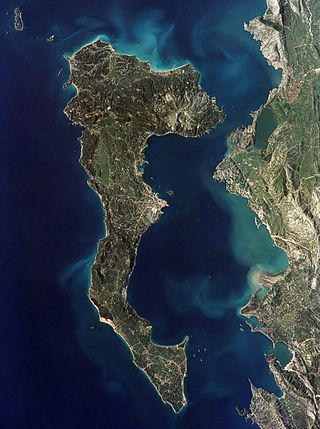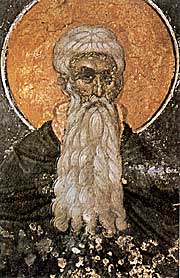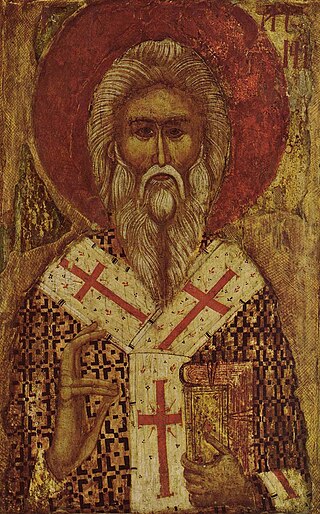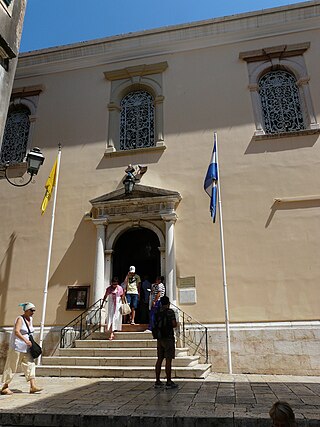Related Research Articles
Pope Adrian II was the bishop of Rome and ruler of the Papal States from 867 to his death. He continued the policy of his predecessor, Nicholas I. Despite seeking good relations with Louis II of Italy, he was placed under surveillance, and his wife and daughters were killed by Louis' supporters.

Corfu or Kerkyra is a Greek island in the Ionian Sea, of the Ionian Islands, and, including its small satellite islands, forms the margin of the northwestern frontier of Greece. The island is part of the Corfu regional unit, and is administered by three municipalities with the islands of Othonoi, Ereikoussa, and Mathraki. The principal city of the island is also named Corfu. Corfu is home to the Ionian University.

May 7 - Eastern Orthodox Church calendar - May 9
Spyridon, Bishop of Trimythous also sometimes written Spiridon is a saint honoured in both the Eastern and Western Christian traditions.
Arsenius and Arsenios is a male first name. It is derived from the Greek word arsenikos (ἀρσενικός), meaning "male", "virile".

Corfu or Kerkyra is a city and a former municipality on the island of Corfu, Ionian Islands, Greece. Since the 2019 local government reform, it is part of the municipality Central Corfu and Diapontia Islands. It is the capital of the municipality and of the Corfu regional unit. The city also serves as a capital for the region of the Ionian Islands. The city is a major tourist attraction and Greek regional centre and has played an important role in Greek history since antiquity.

January 18 - Eastern Orthodox liturgical calendar - January 20

John the Dwarf, also called John Colobus,John Kolobos or Abba John the Dwarf, was a Coptic Desert Father of the early Christian church.
Arsenius served as the Greek patriarch of Alexandria between 1000 and 1010.

Arsenius the Deacon, sometimes known as Arsenius of Scetis and Turah, Arsenius the Roman or Arsenius the Great, was a Roman imperial tutor who became an anchorite in Egypt, one of the most highly regarded of the Desert Fathers, whose teachings were greatly influential on the development of asceticism and the contemplative life.

The Paromeos Monastery, also known as Baramos Monastery, is a Coptic Orthodox monastery located in Wadi El Natrun in the Nitrian Desert, Beheira Governorate, Egypt. It is the most northern among the four current monasteries of Scetis, situated around 9 km northeast of the Monastery of Saint Pishoy. Ecclesiastically, the monastery is dedicated to and named after the Virgin Mary.
12 Pashons - Coptic calendar - 14 Pashons

Arsenije Sremac was the second Archbishop of the Serbian Orthodox Church (1233–1263) and a disciple of Saint Sava of Serbia.

Mitrofan Ban was Bishop of Cetinje, Metropolitan of Montenegro, and exarch of the Serbian Orthodox Church. He was also Archimandrite of the Cetinje monastery. He presided over the Holy Bishopric Synod (1919-1920) that unified the Serbian Orthodox Church in 1920.
Nikolaos Sophianos was a Greek Renaissance humanist and cartographer chiefly noted for his Totius Graeciae Descriptio map and his grammar of Greek. He was born into the local nobility of Corfu at the beginning of the 16th century and was educated at the Greek Quirinal College in Rome, co-founded by another Greek scholar, Janus Lascaris, who also became his teacher along with Arsenius Apostolius. Sophianos did not return to live in Greece, only briefly visiting in 1543. He spent the rest of his life in Rome, where he became a librarian, and in Venice, where he worked as a copyist. His cartographical work was published in 1540.

Emmanuel Tzanes, also known as BounialisEmmanuel Tzane-Bounialis, Emmanuel Zane, and Emmanuel Tzane, was a Greek Renaissance painter, author, clergyman, and educator. He spent the latter half of his life in Venice, where he was parish priest of the church of San Giorgio dei Greci and a member of the Flanginian School run by the city's Greek Confraternity. Tzanes painted in the style of the Cretan School, influenced by contemporary trends in Venetian painting. His known extant works, over 130 in number, can be found in public foundations, private collections, churches and monasteries in Greece. The most popular of these is The Holy Towel, finished in 1659. Tzanes was a collaborator with Philotheos Skoufos, and brothers with the painter Konstantinos Tzanes and the poet Marinos Tzanes.
Arsenios Autoreianos, , Ecumenical Patriarch of Constantinople, lived about the middle of the 13th century.

The siege of Corfu in 1537 was led by the Ottoman Emperor Suleiman the Magnificent, against the Republic of Venice-held island of Corfu. It is part of the Ottoman–Venetian War (1537–1540), one of the numerous Ottoman–Venetian Wars of the period.

Saint Spyridon Church is a Greek Orthodox church located in Corfu, Greece. It was built in the 1580s. It houses the relics of Saint Spyridon and it is located in the old town of Corfu. It is a single-nave basilica and its bell tower is the highest in the Ionian Islands. It is the most famous church in Corfu.

Cathedral of Saint Jacob and Saint Christopher (Greek: Ιερός Καθολικός Μητροπολιτικός Ναός and ) is the seat of the Roman Catholic Archdiocese of Corfu, Zakynthos and Cephalonia. The church houses an extensive collection of paintings one of the most important is the Virgin Vrefokratousa Enthroned by Konstantinos Tzanes painted in 1654.